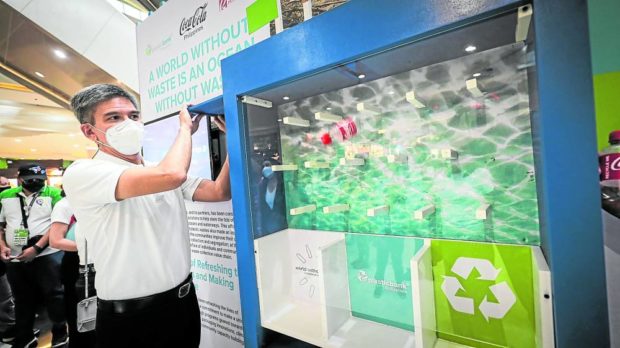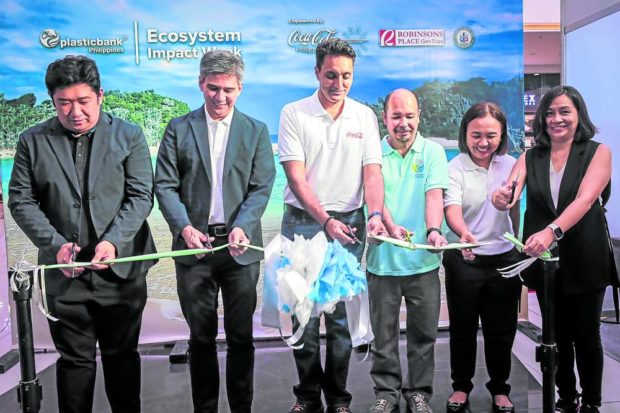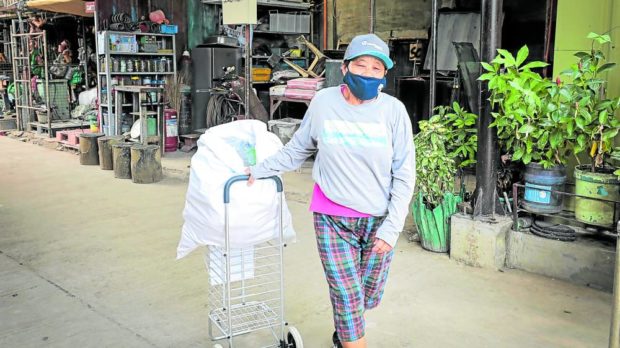General Trias is showing how to keep plastic out of water

Mallgoers are encouraged to bring their own plastic bottles to Robinsons Place General Trias. The Coca-Cola-Plastic Bank partnership has diverted 5 million plastic bottles from oceans and landfills.
Landlocked General Trias in the province of Cavite has embarked on an initiative many coastal areas have not even considered yet.
In partnership with Plastic Bank and Coca-Cola, the city is conducting barangay-based campaigns to reduce plastic waste that would have eventually ended up in the province’s water bodies and, eventually, seas and oceans. The collected plastic is recycled, upcycled or reused as much as possible.
The effort is more for self-protection. The city is becoming an industrial hub with an export processing zone and major companies opening—or planning to open—facilities in this part of Cavite.
Renato Escurel, city environment and natural resources officer, said this development was working like a magnet, drawing people to the city in the hope of finding jobs in the industries and businesses located in General Trias. A significant percentage of the small city’s population growth, Escurel said, came from this influx of workers rather than natural births.
The industrial and population growths could result in a serious garbage problem, if the city did not act on the situation before it reached crisis point.
Article continues after this advertisementWith the help of Plastic Bank and Coca-Cola, the local government decided to be proactive and start dealing with waste, particularly plastic, disposal problems before they became unmanageable.
Article continues after this advertisementGeneral Trias’ efforts at minimizing the plastic waste problem was showcased during the recent Ecosystem Impact Week celebration that culminated in the observance of World Oceans Day.

Coca-Cola Philippines, together with Plastic Bank, officially opened the Ecosystem Impact Week on World Oceans Day in Robinsons Place General Trias on June 8 with a public exhibit on their waste collection initiatives, including a collection booth, where mallgoers can bring clean and used plastic bottles for recycling. —contributed photos
In simple ceremonies at Robinsons Place General Trias, partners in the city’s campaign for the collection and recycling of plastic waste shone the spotlight on and rewarded some of the city’s most dedicated and hard-working collaborators—street sweepers, trash collectors and junk shop owners.
Educating Filipinos
The Ecosystem Impact Week also sought to educate more Filipinos on the value of collecting and recycling plastics. A Plastic Bank Experiential Hub was set up at Robinsons Place to educate shoppers about the importance of saving the oceans. Shoppers were also encouraged to exchange PET (polyethylene terephthalate, the material most commonly used for food and liquid containers) bottles for freebies.
Theme of the event was “Pigilan ang Pagkalat ng Plastic sa mga Karagatan” (stop plastic pollution of seas).
One of the honorees, Victoria Advincula, a 65-year-old street sweeper, found that she could supplement her income by collecting, cleaning and selling plastic to junk shops. “I now have money to give my grandchildren and buy enough food for my family. I don’t have to borrow anymore and I am also helping my community,” she said
Jennifer Arcilla, owner of Jecka Junkshop, partnered with Plastic Bank to grow her business. Her success prompted her to drive a truck herself as the volume of plastic to be collected grew. The sight of her driving a truck caught many people by surprise as they did not expect a woman to drive a large motor vehicle.
Speaking at the opening of the weeklong event, Plastic Bank country manager Rene Guarin reminded the audience that seas and oceans were “sources of food and medicine [and major contributors to] economies … Whatever happens to them, affects everyone.”

“Nanay” Vicky, a waste collector in General Trias, Cavite, is among the beneficiaries of the Coca-Cola and Plastic Bank partnership.
Plastic Bank is a social enterprise that builds collection and recycling ecosystems in coastal communities by working directly with individuals in the informal waste sector and micro and small enterprises like junk shops.
It gives collector partners access to training, tools and equipment for efficient waste collection, and a source of livelihood. The program also connects collectors to materials recovery facilities or junk shops that will buy the plastic they collect to ensure the sustainability of the program.
Local partners
General Trias Mayor Antonio Ferrer, in a message read by Kristine Perdito-Barison, chair of the city committee on environment, echoed Guarin’s message. He pointed out that nature, including bodies of water, gave life. “It is a source of food, medicine and livelihood.”
Tony del Rosario, president of Coca-Cola Philippines and vice president for East Franchise Operations of Coca-Cola Asean (Association of Southeast Asian Nations) and South Pacific, explained the beverage company’s strong commitment to solving the plastic waste problem. “We recognize our responsibility to help address waste issues. In 2018, we resolved to recycle every bottle and can we sold by 2020.”
Coca-Cola is pursuing the goal of World Without Waste.
Plastic Bank and Coca-Cola Philippines are working together to collect 10 million postconsumer PET plastic bottles this year to address and solve the global packaging waste issue while improving the lives of partner collectors and junk shops enrolled in the Plastic Bank Ecosystem Impact Program.
This is double their target in 2021, when 5 million used PET bottles were successfully recycled and diverted from landfills and oceans.
—Linda B. Bolido, contributOR INQ
For more information about Coca-Cola’s World Without Waste goals, visit www.coca-cola.com.ph/en/sustainability/worldwithoutwaste.